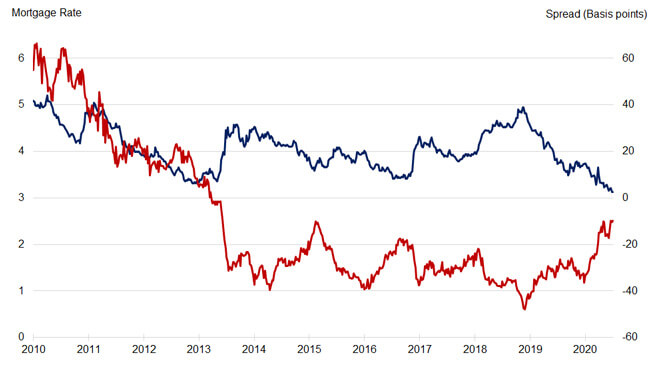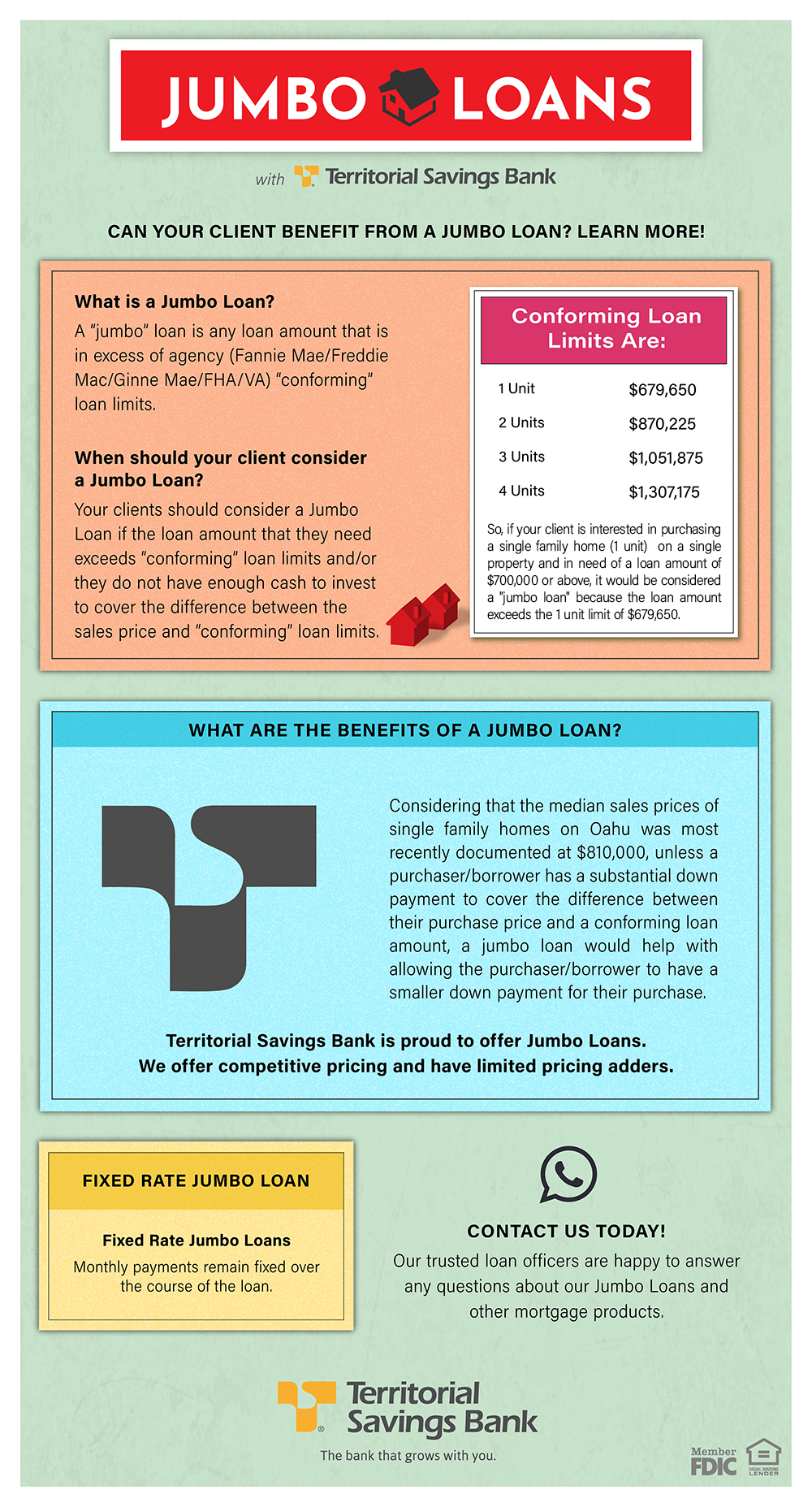Browsing the Jumbo Loan Process: Expert Tips for Getting Your Dream Home
Browsing the Jumbo Loan Process: Expert Tips for Getting Your Dream Home
Blog Article
Checking Out the Benefits and Qualities of Jumbo Loans for Your Following Home Purchase Choice
As the actual estate market develops, recognizing the details of jumbo finances ends up being significantly essential for potential property buyers considering high-value properties. To fully appreciate how big fundings can influence your home purchase approach, it is necessary to explore their key attributes and benefits in higher detail.
What Is a Jumbo Loan?

Jumbo loans are typically utilized by customers seeking to buy high-value buildings or homes in pricey markets. jumbo loan. Given the larger amounts borrowed, lenders generally enforce more stringent credit scores requirements, including greater credit history, reduced debt-to-income proportions, and bigger deposits. The rates of interest on jumbo fundings might be slightly greater than those on adapting loans, mirroring the increased danger for lending institutions
In addition, the approval procedure for a jumbo financing can be much more intricate and lengthy, as lenders require comprehensive documentation to examine the consumer's financial security. Recognizing these nuances is essential for possible house owners thinking about a jumbo finance for their home financing demands.
Key Benefits of Jumbo Car Loans
One considerable advantage of big car loans is their capability to finance higher-priced residential properties that surpass adjusting finance limitations. This feature makes them an eye-catching option for buyers seeking to purchase high-end homes or properties in high-cost locations where prices commonly surpass conventional finance thresholds.
In addition, jumbo finances frequently include flexible terms and competitive rate of interest, enabling consumers to customize their financing to match their distinct monetary situations. jumbo loan. This adaptability can consist of options for adjustable-rate mortgages (ARMs) or fixed-rate loans, offering customers with the capability to manage their regular monthly payments according to their preferences
An additional advantage is that jumbo fundings do not need private mortgage insurance coverage (PMI), which can considerably reduce the overall expense of the finance. With PMI often being a considerable expense for conventional lendings with low down settlements, preventing it can bring about considerable financial savings with time.
Additionally, consumers of jumbo financings commonly have access to higher funding quantities, enabling them to spend in buildings that fulfill their way of living requires. This accessibility equips buyers to act decisively in competitive real estate markets, safeguarding their preferred homes extra effectively. On the whole, jumbo fundings supply crucial advantages for those seeking to fund premium buildings.
Eligibility Needs for Jumbo Finances
Jumbo financings come with details eligibility requirements that possible debtors have to satisfy to safeguard financing for high-value buildings. Unlike traditional lendings, which have established restrictions based upon the conforming lending limits developed by government-sponsored entities, jumbo financings surpass these limits, demanding more stringent standards.

Furthermore, big car loans often necessitate a considerable down payment, often varying from 10% to 20% of the purchase rate, depending on the lender's plans and the consumer's monetary scenario. Cash books are likewise thought about, with numerous lending institutions expecting debtors to have a number of months' well worth of mortgage repayments easily available. Last but not least, extensive documentation of income and properties will be required to support the lending application. Satisfying these eligibility requirements can place debtors favorably in securing a big loan for their desired home.
Comparing Jumbo Fundings to Conventional Fundings
Comprehending the differences in between jumbo loans and traditional car loans is vital for buyers browsing the high-end realty market. Jumbo car loans exceed the conforming loan limits set by the Federal Real Estate Financing Firm (FHFA), which means they are not eligible for acquisition by Fannie Mae or Freddie Mac. This leads to various underwriting criteria and demands for consumers.
On the other hand, conventional lendings usually follow these limitations, enabling a much more see this page streamlined authorization procedure. Jumbo financings commonly call for stricter credit score scores, larger deposits, and greater economic reserves. As an example, while a traditional financing may need a down payment of as little as 3% to 5%, jumbo finances generally necessitate a minimum of 10% to 20%.
Rates of interest on jumbo loans might differ from those of conventional loans, commonly being slightly higher because of the boosted risk loan providers think - jumbo loan. The potential for substantial funding can be helpful for purchasers seeking luxury buildings. Ultimately, comprehending these distinctions makes it possible for buyers to make educated choices, aligning their funding alternatives with their distinct buying demands and financial circumstances
Tips for Protecting a Jumbo Car Loan
Securing a jumbo car loan calls for mindful planning and preparation, as lenders typically enforce stricter requirements contrasted to conventional loans. To improve your opportunities of approval, begin by examining your credit rating rating and addressing any type of problems. A rating of 700 or higher is typically favored, as it demonstrates credit reliability.
Following, collect your monetary documents, including tax obligation returns, W-2s, and bank statements. Lenders normally need detailed proof of revenue and possessions to evaluate your capacity to settle the financing. Maintaining a reduced debt-to-income (DTI) proportion is additionally important; go for a DTI below 43% to enhance your application's competitiveness.
Furthermore, take into consideration making a bigger down settlement. Several lenders look for a minimum of 20% down for jumbo fundings, which not only lowers your loan amount however also signals economic stability. Engaging with an experienced home loan broker can supply vital insights into the process and assist you navigate different lender choices.
Conclusion
In recap, jumbo financings existing considerable advantages for buyers seeking properties that surpass standard loan limitations. Extensive understanding of both the demands and benefits connected with jumbo fundings is important for making notified home purchase choices in an affordable real estate market.
The rate of interest prices on jumbo fundings may be slightly higher than those on here adjusting fundings, reflecting the increased threat for loan providers.
While a standard funding may need a down payment of as little as 3% to 5%, big financings typically require a minimum of 10% to 20%.
Rate of interest rates on jumbo lendings might differ discover here from those of standard fundings, usually being somewhat higher due to the boosted threat lenders think.Securing a big funding calls for careful planning and prep work, as loan providers usually enforce more stringent requirements compared to standard lendings. Many loan providers look for at the very least 20% down for big financings, which not only lowers your funding quantity yet also signals economic security.
Report this page